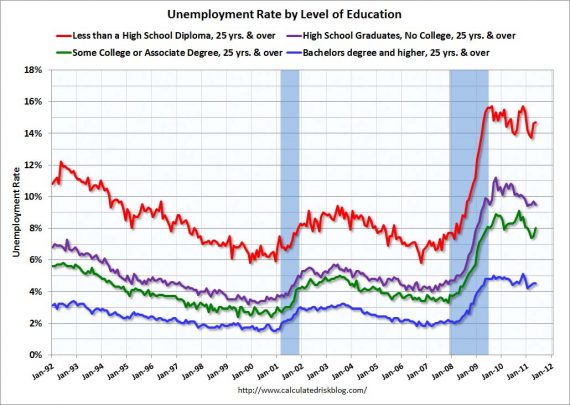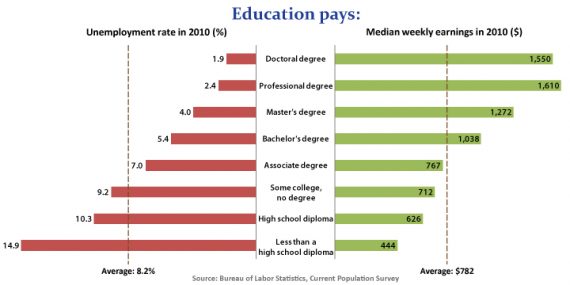Unemployment and Education
Your major matters. But not as much as simply having a degree.
On most every thread about higher education, I will get one or more comments along the lines of “Americans had better start educating themselves in practical fields like business, accounting, engineering, and computer programming because there’s no work for people with worthless humanities degrees.” There’s very little evidence for this proposition.
Calculated Risk graphs unemployment and educational level:
Similarly, the Bureau of Labor Statistics charts employment rates and median weekly earnings by education level:
Now, this doesn’t break down the data in terms of majors. Certainly, some endeavors pay more than others. But the bottom line is that there’s very little unemployment for those who have attained at least a bachelor’s degree. Almost all of the unemployed are those with a high school diploma or less.
Let’s stipulate that the earnings figures are skewed by a handful of professions, notably law and medicine, that require a bachelor’s degree plus as a barrier to entry. But even those with no education above a bachelor’s–thus excluding doctors and lawyers–are half as likely to be unemployed and average half again as much salary as those with no education beyond high school.
As Dave Schuler frequently points out, there aren’t enough jobs out there for everyone to become an engineer. Or, indeed, enough engineering jobs for all those who’ve already attained engineering degrees. Still, if you’re mathematically and spatially oriented and enjoy that sort of work, I would highly recommend that over studying, say, Elizabethan poetry. Then again, if you’re inclined for the job, I’d recommend that you become a plumber or a union carpenter rather than a political science PhD. But the bottom line is that we have an economy that continues to be reasonably good for those who have attained a college degree and is increasingly frustrating for those who have very little educational attainment.







It won’t matter what your degree is in when most areas of the economy are collapsing. We don’t get it in this country, because if we did, things wouldn’t have gotten this bad. In short, that means our lives are going to get much worse because we think our old ways of solving problems are still valid today. Big mistake, and we’re paying for it.
FIGHT THE CAUSE – NOT THE SYMPTOM
OsiXs (Revolution 2.0)
The first sentence is a misdirection, but still. Talk about a stubborn cognitive bias. And probably a little dissonance too …
You do understand that in our society supply and demand sets prices, right? You understand that price rations rare goods, right? And so when society sets a high price it is recognizing that the good is both rare and in demand.
Thus, the highest prices (salaries) for fresh graduates are a measure of their scarcity and their desirability.
That’s fundamental
Best Undergrad College Degrees By Salary.
Now as I say, the first line, the idea that everyone can or should be an engineer, is pretty crazy. But even so there is an obvious feedback loop. We can actually tell when too many people are getting those degrees.
Prices fall. Salaries fall.
Now lets compare those engineers, with their $90K starting salaries, to the general graduate pool:
Hmmm. $90K is how much bigger than $50K? And yet “Your major matters. But not as much as simply having a degree?”
Maybe that suggestion that humanity students should take a little more math is accurate.
JP. I still don’t get what you are on about.
There are a box of bad ideas surrounding education, sam.
One bad idea is that “Your major matters. But not as much as simply having a degree?”
The data run contrary.
Now, if you want to be non-cryptic, step up and explain higher costs and lower return on investment for students.
“Now, if you want to be non-cryptic, step up and explain higher costs and lower return on investment for students.”
How does that figure into your obvious animus against the humanities? Unless you want to say that getting rid of humanities requirements, and thus shortening the time to a degree, preferably in petroleum engineering, is the way to go. Is that what you’re on about?
Ah sam, you fail.
You could have engaged positively, right? You could have put the humanities in a vision of higher value, return on investment, for students.
I just asked you a simple question, for Christ’s sake.
Of course it wan’t a simple question, sam. It was an indictment.
Have some self-awareness.
Since the title of the article is “Unemployment and Education,” I assumed the quoted statement referred to simply being employed as opposed to salary levels.
Data are available
The College Majors That Do Best in the Job Market
(If I observe that 69.4% of engineering graduates have jobs which required degrees, as opposed to 45.4% for humanities … that would obviously be my “obvious animus” as opposed to anything data driven.)
As far as whether you are employed at all, I think the data shows that James is right in his point. The difference in unemployment rates between college degree or not is bigger than the difference between majors of college grads. I agree that starting salaries start to show a very large discrepancy between majors, though.
Ben, please follow my link. Being employed at all also includes working … well as one young couple I knew with english/history degrees, respectively as a furniture salesman and a dress saleswoman.
That page shows 8.7% of engineers working in areas which do not require degrees, as opposed to 29.4% for humanities.
That datum should be shocking.
No kidding.
Sure, but not everyone can be an engineer. I can’t sing, but I can do math. I can’t play basketball worth a damn, but I can do sports that require a fair amount of endurance. My point is that people have innate abilities and while it is great to say to a kid going into college, “Petroleum Engineers make fantastic salaries.” It can also be problematic if that kid just isn’t geared up for the math. He might end up dropping out with no degree. In which case, having a degree would have been preferred.
John,
Maybe you should stop with the mind reading schtick. It makes you come across as an asshole.
Interesting data, but some of those graduates that have jobs got them as early as 2007/6. Prior to the recession, prior to many states having budget crises, etc. Teaching right now is probably not as good as it once looked. That is the problem of relying simply on historical data that is a bit out of date.
That doesn’t mean that humanities is the best option for a college degree, but you should be somewhat forward looking as well as looking at the historical numbers.
Why? Does a person who gets a degree in humanities have to start looking for a job in humanities? What if a college education is a signal for willingness to put forth work effort (see the work of Spence, Milgrom, and Roberts). In which case, having a degree in the humanities could be better than having no degree. And if you don’t have talent for doing math, maybe that is a good option.
“You could have engaged positively, right? You could have put the humanities in a vision of higher value, return on investment, for students.”
John, I’d never win that argument with someone who thinks the value of an education is to be measured in the salary said education enables one command in the marketplace.
You win.
I would feel very differently if college were a low-cost interlude, a time of personal development, after which students could fan out to their own employment destinies.
If that were true, it wouldn’t be sad that 29.4% of humanities graduates were under-employed.
But you see what you are yielding me, right? When you say “you win?”
You recognize at some level that an expensive investment is not paying off.
(Steve V, get a life)
(Or to state it differently Steve, I find nothing so compelling in your counter-arguments that I need respond. You do have the requisite ad hominems in there though, good work.)
“Why? Does a person who gets a degree in humanities have to start looking for a job in humanities? ”
FWIW, my degrees, as most of you know, are in philosophy, but I spent the last of my working years doing high-level tech support for a major computer manufacturer. Where you start ain’t necessarily where you end up.
What were you whining about on Dave’s site about lame insults?
And it isn’t an ad hominem if it is true.
Sam,
I agree.
Contra JP, see, Bad Job Market: Why the Media Is Always Wrong About the Value of a College Degree
Go ahead then, and show me a lifetimes earning study, based on college degree.
But as philosophers, some of you, I’m sure you wouldn’t push an argument from missing data at me.
You wouldn’t say, imply that data none of us has, improves your case.
Sam, I couldn’t’ see in my skim where that article talked about the relative (economic) values of degrees.
Excellent cat fight.
And to parrot one of my ex-partner’s great quotes: “I feel strongly both ways.”
Can’t we just come to a conclusion that formal education really should be about teaching critical and investigative thinking skills – because from there you can go anywhere (Heh. Like a process engineer in a steel mill, to a small business manager, to a leveraged lending professional, to a private equity partner??) – but that certain degrees (like engineering) are more in demand and provide a higher employer return in the early years of on’es career?
I confess a certain bias towards what I will call hard sciences: engineering, computer science, economics and so forth. But having never been a philosophy major it would be arrogant and probably incorrect to assume that those folks don’t develop the very same critical thinking skills I advocated in the first paragraph. But it is probably true that in the early post-graduation years most philosophy grads suffer from a problem with employers that the Jack Nicholson/Whitey Bulger character in “The Departed” expressed to DiCaprio/Billy Costigan, obvioulsy seeing latent talent: “So I ask myself, what can I use ya fer?”
I don’t really disagree with your “I feel strongly both ways” Drew, but there is some data suggesting starting salaries do have lifetime earning impacts:
That’s an article on low job demand during the recession, but I think we can see how it would generalize further. That is, every future employer looks a previous salary when making an offer.
@john personna FWIW, I don’t doubt that some jobs pay more than other jobs and that some majors or more likely than others to lead to those higher-paying jobs. But not everyone’s got the interest or aptitude for every job. I could have made more money as an accountant than I’ve made as a political scientist. But I’d be miserable.
The post is simply aimed at the broader notion that getting an education for its own sake doesn’t pay off economically. Getting a college degree remains a path to economic success and we shouldn’t dissuade people from getting an education on the basis of silly mythology.
That is a very graceful summation James, but I’m going to hold out that there is a tension between education not being career targeted, but education being career justified.
And certainly in practice we should encourage the college-bound high schooler to review those starting salary lists, starting at the top and working their way down, looking for compatibility.
There was a moment when a co-worker of mine in the 80’s said “you got into computers for the money?” I think I said “basically, yeah.” And he shook his head sadly.
There were a lot of things I could have done with the same level of anal retention, but it was a good time for computers.